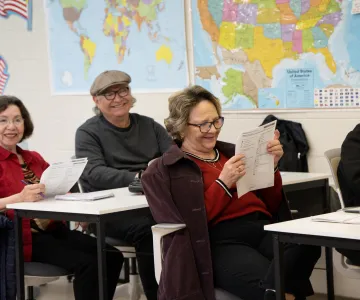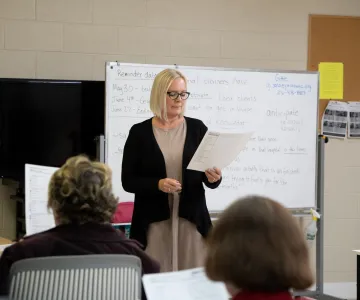In 2026, we proudly celebrated 35 years of empowering adults and strengthening our community through education and opportunity.
The YMCA Literacy Initiative serves nearly 300 adult learners each year through our core programs: Adult Reading and English for Speakers of Other Languages (ESL) along with Financial Literacy and Citizenship Preparation classes.
Our dedicated volunteer tutors and instructors provide individualized instruction designed to meet each learner where they are, helping them achieve their personal, professional, and family goals. To support parents, we also offer a KidZone, allowing them to focus on learning while their children are cared for in a safe, engaging environment.
More than 20% of North Carolinians read below a fifth-grade level or struggle to speak English well enough to support their families or secure meaningful employment. The YMCA Literacy Initiative exists to change that.
Through free, accessible, and community-based programs, we help adults build literacy, language, and life skills that open doors; improving communication, confidence, and opportunities for success at home, at work, and in the community.
Join us as we celebrate 35 years of transforming lives through literacy at the YMCA of Northwest North Carolina!
English for Speakers of Other Languages (ESOL)
Come join us in learning English. This course will help you communicate at work, in everyday situations, with the use of technology, and prepare you for academic programs & career training. This course is being provided to the community at no cost.
Ven y únete a nosotros para aprender inglés. Este curso ayudará a las personas a comunicarse en el trabajo, en situaciones cotidianas, con el uso de la tecnología, y preparará a los participantes para programas académicos y capacitación profesional. Este curso se proporciona a la comunidad sin costo alguno.
Reading Classes
Need to improve your reading skills? Register for one-on-one instruction with a Reading tutor to help you achieve your goals. Tutors and adult students usually meet twice a week and work on reading strategies. This is provided free of charge to the community.
For our volunteers: submit your monthly tutor report here.
Become a Volunteer Tutor
You can make a lasting difference in someone’s life by becoming a YMCA Literacy tutor! Our volunteers help adult learners improve their reading, writing, and English language skills, empowering them to achieve greater confidence and independence.
All new tutors are required to complete a tutor training session and because we often have a waitlist of students ready to learn, we also offer one-on-one training so you can get started quickly.
We also host Tutor Gatherings for continued learning, enrichment, and idea sharing. After training, we’ll match you with an adult learner, provide materials, and support you every step of the way.
Tutors are encouraged to attend at least two additional workshops or sharing events during their first year to strengthen their skills and connection to our literacy community.
Ready to empower others through education? Join our YMCA Literacy team today! Click here.
Volunteer Orientation and Training
Tutor training sessions are required for all new volunteer tutors, including Reading tutors and ESL tutors. However, because we often have a waiting list of students who need a tutor, we also offer one-on-one tutor training so that you may get started more quickly. We also offer tutor gatherings on the first Friday of every month; these gatherings provide training, enrichment, and idea/knowledge sharing among staff and volunteers.
After the initial training we will match you with an adult student, provide materials, and help you get started. We ask that you attend at least two more workshops or tutor sharing events during your first year of tutoring. They will be offered on a variety of more specific topics.
Each side of the program has its unique challenges, but YMCA Literacy prepares volunteers with training, appropriate materials and ongoing support, to ensure the best experience for both learner and tutor. Anyone can be a tutor, no prior experience or foreign language skills are required. With patience, a little creativity and a desire to help others reach their goals, you can make a difference.
The need is larger than we are, we often have a waiting list of learners across the city that need tutors. With increased volunteer support and donations, we can expand our current programs even further, and pursue new partnerships, in specific areas like family literacy, workforce literacy, and computer literacy.
The Literacy Initiative was founded in 1990, by a partnership between the United Way of Forsyth and Leadership Winston-Salem, with funding from the Winston-Salem Foundation. In 1993, the Literacy Initiative began training volunteer tutors to provide direct service to low-level readers in the community. In 1994, the organization absorbed the Forsyth County Literacy Council and the YMCA Literacy Initiative became the focal point of adult literacy coordination in the county. The ESL program was added in 2001 in response to the growth of the Latino community in Forsyth County, but with a mission to serve English language learners of all nationalities.
Today, the program is still grounded in volunteer-based, one-on-one tutoring. In 2019, we served 330 adult learners through our one-on-one tutoring, small groups, and ESL classes. Each year, our volunteers contribute over 4,000 hours of free instruction for adult learners. Most tutors and learners meet twice a week, for a total of three hours, usually in a YMCA tutoring room. YMCA Literacy has resource rooms conveniently located at the Robinhood Road Family YMCA. Here, tutors and learners have access to a library of quality books, classroom materials, and computers, as well as a quiet space to learn.
On both the Adult Reading and ESL sides of the program, diversity is a hallmark. In Adult Reading, learners come to the program at different stages of life; ages range from early 20s to 70s. Their individual goals vary from obtaining a GED to being able to read to their grandchildren. ESL learners come from all over the world; including countries like Venezuela, South Korea, Syria, Russia, Mexico, Burma, and Honduras. They also come from a wide variety of backgrounds and have diverse goals. Some have advanced degrees in their home countries, some wish to prepare for job interviews, and others want to be able to understand their children's schoolwork. A few learners are preparing for citizenship applications, and some want to fine-tune their English pronunciation.

